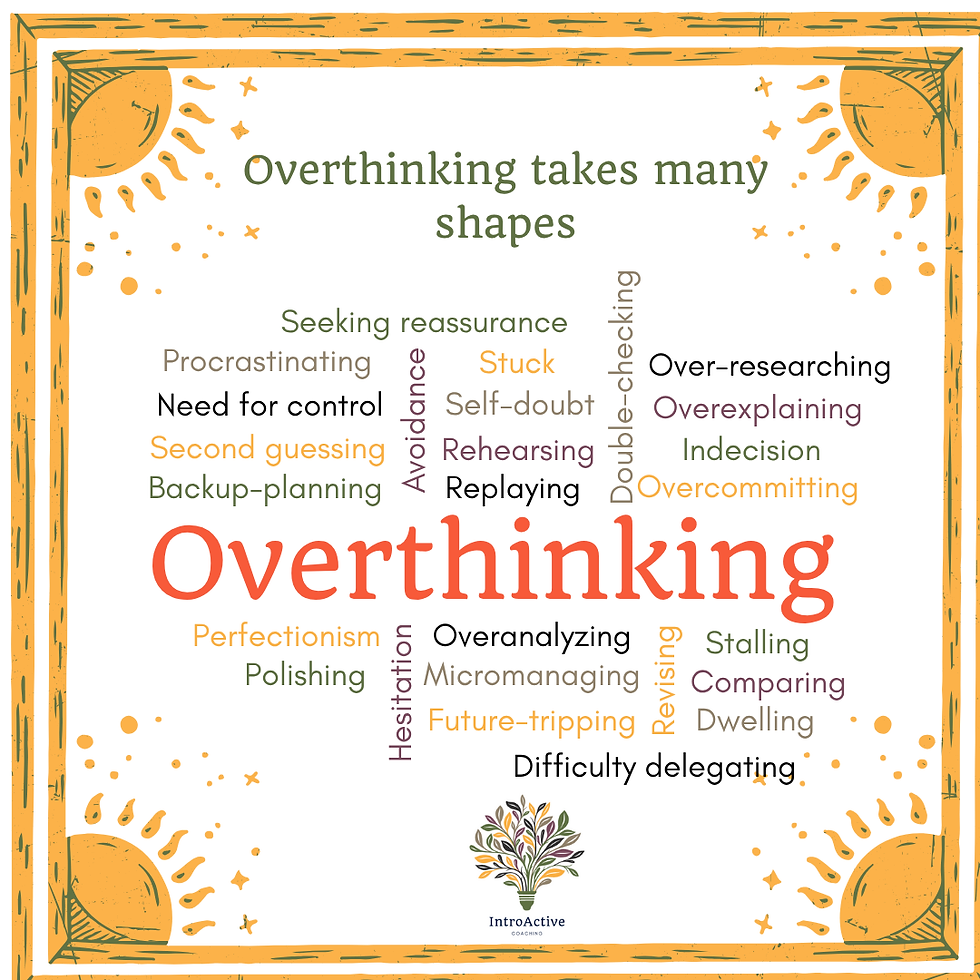The overthinking spiral - from mind loops to negative emotions
- Izabella Rehák
- Sep 16
- 4 min read
Here I am. Just came back from work, and there was a situation that upset me. In fact, I felt embarrassed, angry, not heard. I didn't agree with how things went down and despite me trying to voice this, the message didn't come through. My mind was already spiraling on the way home. I've replayed the scenario over and over, then was thinking I could have handled the situation 'better', then blamed myself for not doing it that way straight away. Upon arriving home, I only had a few minutes to change to my tennis gear and off we went with my husband to our weekly tennis game. I really enjoy playing tennis and it is certainly a type of sport that clears my mind and gets my full attention. Not to mention how great it is that we can do sports together with my hubby. This time however my mind couldn't ease, couldn't focus on the game, it was still spinning about the situation at work. I missed many of my shots making me even more angry and annoyed. I even realized how this is not helpful, that by letting go of those negative thoughts and have a good game would make me feel immensely better. Yet, my mind couldn't stop. There it was the scenario playing over and over again while my shots going all over the place. In the end I was just checking my watch constantly to see when the session will end so I can finally go home and continue ruminating. It was only until the next morning, that I finally could let go of the situation and start the day with a more calm perspective. Very tired though, because even my sleep was impacted by the overthinking.
So let's break down what happened.
What is overthinking?
Overthinking is the repetitive and prolonged focus on one’s thoughts—often about past events (rumination) or future possibilities (worry)—in a way that is unproductive, emotionally distressing, and interferes with effective decision-making or action.
The overthinking spiral - from mind loops to negative emotions
How does it usually go down?
A very typical pattern activates when we start ruminating. It affects our thoughts, feelings and body.
As we get stuck in these thought spirals more and more often, it may start impacting our lives in negative ways:
Stress building up: With each spiral, it is not only our mind that reacts, it's our body as well, starting to release stress hormones. If the overthinking becomes regular our body doesn't get the chance to calm down and stress becomes our second nature.
Sleep gets impacted: as our mind can't stop spinning, we may struggle to fall asleep, or wake up in the middle of the night with the same thought playing on repeat. If it happens more frequently, we start to feel more tired during the day, potentially leading to more worry over the future or more 'awkward' situations during the day to trigger the overthinking spiral all over again.
Reduced confidence: having these negative thoughts remaining unresolved, we may find ourselves becoming more insecure about things we didn't worry too much before and getting more cautious with every move we take.
Avoidance: ultimately, this can lead to avoiding certain, usually social situations as we get more and more reserved and afraid of taking any action.
Generalized habit: despite there's no resolution, the brain can easily get used to thought spirals leading to overthinking becoming our prime coping mechanism.

Is overthinking adaptive?
Overthinking is not necessarily a bad thing. Imagine that after me replaying the scenario, I'd stopped and after a good tennis game and fresh perspective replaying it again lead me to a creative solution to resolve it right there the next day. Thinking and reflecting helps to look at things from different angles, assess risks , create plans and make better decisions. Often these can be more creative solutions, while we take the time to learn from past mistakes.
Overthinking can get maladaptive when it is a repetitive, unproductive thinking process, leading to no real resolutions, decision paralysis and heightened negative emotions.
What will I do different the next time?
I'm a reflective person who tends to internalize things. Letting myself think it through will happen. But learning to stop the spiral before it overtakes my entire mind, is a good step forward. For instance, setting a fix time a day, e.g. 5 minutes every morning for 'worry time' can help focus and externalize these thoughts. Journaling about thoughts and feelings always gives me an ease of mind. But after my session, I go on with my life and don't stay stuck. Tennis or another sport can be a great way to clear our minds and calm our bodies from the built up stress. A creative hobby can also serve as a productive distraction. While you are in the flow of arts or crafts, your mind can come up with great new solutions. At the same time, you will feel more at ease and relaxed and charged with positive emotions.
Reference
Brosschot, J. F., Gerin, W., & Thayer, J. F. (2006). The perseverative cognition hypothesis: A review of worry, prolonged stress-related physiological activation, and health. Journal of Psychosomatic Research, 60(2), 113–124. https://doi.org/10.1016/j.jpsychores.2005.06.074
Nolen-Hoeksema, S. (2000). The role of rumination in depressive disorders and mixed anxiety/depressive symptoms. Journal of Abnormal Psychology, 109(3), 504–511. https://doi.org/10.1037/0021-843X.109.3.504
Selby, E. A., Anestis, M. D., & Joiner, T. E. Jr. (2008). Understanding the relationship between emotional and behavioral dysregulation: Emotional cascades. Behaviour Research and Therapy, 46(5), 593–611. https://doi.org/10.1016/j.brat.2008.02.002



Comments